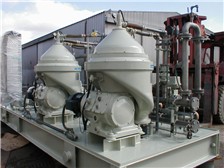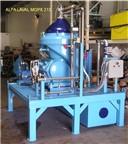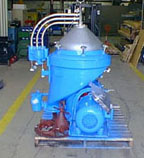 Click to view caption Click to view caption |
| Abdel-Fattah |
Egypt is president of the Non-Aligned Movement (NAM) and New Agenda Coalition (NAC). What kind of contribution are NAM and NAC expected to offer during the NPT revision conference?
First of all, NAM (118 member states) is a major player in this conference, which is expected to address the new challenges facing the NPT. Among the current debates within NAM is one about the additional protocols of the International Atomic Energy Agency (IAEA). NAM wishes to restrict the right of countries to withdraw from the treaty, and it suggests the creation of nuclear fuel banks, a move that is necessary in the light of the expansion in the peaceful use of nuclear energy and in light of the current energy crisis -- many countries now want to build nuclear reactors to generate power. In this year's conference, NAM sought to achieve "universality" for the NPT by bringing into the NPT countries that have nuclear weapons, such as India, Pakistan, and North Korea (the latter withdrew lately from the NPT), as well as those believed to have nuclear capabilities, such as Israel.
You may know that the NPT recognises those nuclear countries that conducted nuclear tests before the NPT came into being in 1968. We believe that those countries have been treated in a privileged manner that transcends the boundaries of the treaty. They have been given special allowances by countries exporting nuclear technology, with no commitment being made in return. This is a serious precedent that cannot be allowed to go on.
Secondly, NAC -- which includes Egypt, South Africa, Mexico, Brazil, Ireland, Sweden and New Zealand -- focuses solely on nuclear armament issues. NAC has gained influence since its success in 2000 in putting together a 13-step working plan and after calling on nuclear countries to implement it. Some of those countries have already implemented parts of the working paper.
The focus now is on "negative security guarantees", in the sense that nuclear countries would vow to refrain from assaulting countries that do not own nuclear weapons. This pledge must be formalised in the shape of a binding document, so as to create a sense of security among the non-nuclear countries and thus dissuade them from acquiring nuclear weapons. Some guarantees have so far been issued as unilateral declarations. And what we're asking for is for these guarantees to become binding. NAC is particularly influential because it contains countries from various regional groups, and is therefore a universal forum that represents various parts of the world and can rally regional support behind specific issues.
What is the position of major nuclear countries on the holding of a regional conference for the creation of a nuclear-free zone in the Middle East?
In all the meetings in which I took part, the US and major nuclear countries voiced support to holding a regional conference on the Middle East, taking into account the developments that took place in the region since 1995.
There have been reports in the US media to the effect that Egypt is exerting pressure to get the Middle East conference held, and has threatened to undermine the NPT revision conference otherwise.
First of all, we are not exerting pressure. Issues related to nuclear weapons have surfaced in various regions, as in the case of India and Pakistan and the two Koreas. Meanwhile, Israel keeps saying that Iran and Arab countries are threatening it. Israel keeps saying these things in various international conferences, and the Israelis keep referring to Syria in particular. Therefore, we must address these issues on the international level and not confine the discussion to the NPT alone.
A decision concerning the Middle East was passed in 1995. The NPT treaty needed to be renewed in 25 years or approved in its original form. Negotiations took place and the countries safeguarding the treaty -- the US, the Russian Federation and Britain -- while attempting to overcome Arab resistance, issued a decision on the Middle East. They also adopted the initiative of President Hosni Mubarak, in which he called for the region to become a nuclear- free zone. Arab countries accepted this decision, which was part of the deal to extend the NPT indefinitely.
Unfortunately, since 1995, no real effort has been made to address the Middle East issue. The Middle East decision surfaced again in 2000 in connection with the issue of whether Iraq had nuclear weapons. No information was available at that time about Iraq's true nuclear capabilities. So it was agreed, in the NPT revision conference, to issue a document calling on Israel to join the NPT and on Iraq to honour its commitments -- the wording was deemed to be as even-handed as possible.
In 2005, nuclear countries refused to address the Israeli nuclear dossier, citing the Iranian nuclear peril. The allegations they made were not corroborated by the IAEA. At the time, Iran said that the uranium that it was using was compatible with peaceful purposes alone. A major dispute ensued and the conference ended without an NPT revision document being issued.
In 2010, the signs are good so far. We have a number of positive initiatives, and the military doctrines, as well as the new visions that have emerged, seem to indicate a shift in the approach of nuclear countries to the matter of proliferation.
The Middle East decision is quite central to the Arab position and I believe it is also central to NAM's approach to the NPT revision. In the international conferences I have attended in the last few months, we have received promises from various countries concerning the Middle East decision. But we haven't seen a shift in terms of practical measures yet. The 2010 conference is going to look into the progress made in the three aspect of the NPT: non- proliferation, peaceful use of nuclear power, and nuclear disarmament. Also, it will look into the 1995 Middle East decision.
Did Arab countries act hastily when they agreed to the conciliatory wording of the 1995 decision?
Arab countries did the best they could in 1995. Back then, clear commitment was made by NPT guardian countries concerning the formation of a nuclear-free zone. It was the countries safeguarding the NPT that passed this decision. Another decision was also made concerning the "universality" of the treaty. Unfortunately, nuclear countries continued to make deals with countries that haven't joined the NPT. It is said that US actions were made under previous administrations, but that doesn't change the fact that those actions made things worse. We have to remind everyone that dealings with Israel must take place in accordance with all the decisions made since the NPT was envisaged in 1968, and not only in accordance with the Middle East decision.
What is the nature of the recent Egyptian bid to hold a regional conference?
Egypt submitted a working paper in the preparatory meetings held in 2007. We proposed the holding of an international conference, one to be chaired by the president of the NPT revision conference including the heads of the three main committees emanating from the NPT, as well as the NPT guardian countries, as members. We also called for renewing the time span for the start of negotiations on the creation of a nuclear-free zone. The aim of our proposal is not to get into confrontation with Israel or any other country, but to formulate a timetable for implementing the Middle East decision and thus overcome the difficulties created by the lack of follow-up. The revision conference is held every five years, which is a long time, and the preparatory meetings are not enough to discuss the issue. Fifteen years have elapsed since passing the Middle East decision, and now we want all parties to sit around one table and get on with the negotiations. We are not attacking anyone. We're asking for a comprehensive deal involving the creation of a nuclear-free zone. There is already a commitment on Egypt's side, and President Hosni Mubarak has come up with two initiatives, proposing to rid the Middle East of weapons of mass destruction once Israel discards its unaccounted-for nuclear capabilities. We are ready for the nuclear-free zone, as President Mubarak made clear in two earlier initiatives.
What are you going to propose at the 2010 conference?
The proposal is to hold a regional conference in 2010 in agreement with the concerned countries and within a framework defined by the IAEA along with Arab countries, Iran and Israel -- the countries belonging to the geographical boundaries of the Middle East. There will be obstacles on the way to reaching an agreement, security misgivings too. But we'll keep the door open, and we won't impose a rigid framework. The matter will be left for interaction among the various parties. Still, we call on nuclear countries to refrain from supplying Israel, which hasn't joined the treaty, with nuclear materials. We will also ask them to explain their reasons for giving such material to Israel. It is ironic that Iran, the country everyone is so worried about now, was the first country to make a proposal for creating a nuclear-free zone in the Middle East -- it did so in 1974. Arab countries didn't join Iran in this call until 1978.
The Middle East conference will be held under the auspices of the NPT. We're asking for a supervising committee consisting of the NPT president and the heads of the three main committees (now chaired by Japan, Ukraine and Zimbabwe), with Egypt as representative of NAM, Britain as representative of Western Europe, and another country representing Eastern Europe. The committee should meet to discuss the executive steps and find ways of overcoming practical difficulties.
Some would say, why would Israel attend such a gathering? What would entice it to do so? My answer is that the conference can also be held outside the NPT scope, but while having a strong link with the NPT. This can be accomplished under the auspices of the UN or a neutral country such as Sweden or Norway. It should be clear that the implementation would take place in the framework of the 1995 decision. Some say that the holding of the said conference hinges on progress in the peace process. My answer to that is that even if peace is a condition -- which is not true -- what can the Arabs offer to Israel more than the Arab initiative which Tel Aviv has rejected repeatedly? Israel claims that peace is inconceivable unless the Iranian nuclear dossier is addressed. So let's start a process of negotiations within a timetable, within boundaries that can be agreed upon, and with security guarantees on both sides. The negotiations may last for several years. The Middle East conference is not a one- off affair.
Can a regional conference succeed in Israel's absence?
The conference can be held in Israel's absence. To clarify this point, let's recall that South Africa stayed away from the NPT conference in Africa for sometime, then it started attending it and became an active player. Likewise, the US stayed away from the maritime law conference and refused to take part in the negotiations, while attending the sessions; then it joined it at a later stage. If major countries wish to address Iran's nuclear dossier, they can do that by bringing Israel and Iran to the negotiating table -- this wouldn't be the first time for the two countries to meet; they talked directly in Cairo last year. This would allow the meeting to confront them and address their nuclear fears. We are opposed to Iran possessing nuclear weapons just as we are opposed to Israel possessing nuclear weapons. Iran may end up having to make some concessions in return for Israel doing the same or for Israel agreeing to the creation of a nuclear-free zone and disposing of its ill-defined nuclear capabilities.
Speaking at the nuclear security summit in Washington, United States President Barack Obama said that he aims to strengthen the NPT. How much do you agree with the vision of the current US administration?
I agree with President Obama on the need to get rid of nuclear weapons across the world. But we also need to address the mistrust that exists among nuclear and non- nuclear countries. With so many countries seeking to acquire peaceful nuclear energy, nuclear countries fear that the temptation to acquire military nuclear capabilities would be hard to resist. These are unjustified fears and must be addressed through a stronger IAEA. The IAEA needs to turn into an independent agency and to end its affiliation with nuclear countries. IAEA, for instance, doesn't own one laboratory in which to analyse the samples collected from countries under investigation. The samples are sent to the laboratories of major nuclear countries, which is a clear conflict of interest.
A lot is being said about non-nuclear countries lacking commitment. Claims are being made that between 18 and 20 countries seek or have obtained nuclear capabilities. But, with the sole exception of North Korea, there has been no confirmation of such claims. We cannot judge things by political appearances. We need to rely on well-documented reports by a stronger and self-reliant IAEA.
Can the conference fail, in the case of a lack of consensus, to agree on the Middle East decision?
It is too early to speak of the success or failure of the decision on the Middle East. From my experience in international conferences of the type, I would say that an agreement on the main issues is unlikely to occur till the last 10 days. The conference will be held for 25 days. I hope we don't have to take positions similar to which took place in 2005. Inspired by the new US administration, we are dealing with the matter in a positive manner.
Imposing constraints on the technology of peaceful nuclear energy is clear double- dealing. What is Egypt's position on this matter?
Egypt rejects the imposition of constraints on the possession of nuclear material for peaceful purposes and for the needs of economic development. Enriching uranium for purely peaceful purposes is a sovereign decision that must be left to the concerned country and that country alone. The IAEA must remain impartial on the matter. The NPT already forbids signatory countries to pass nuclear weapons to third parties, especially terrorist groups.
source: weekly.ahram.org.eg












